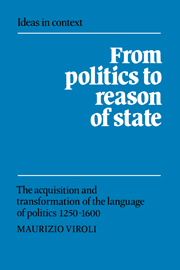 From Politics to Reason of State
From Politics to Reason of State Published online by Cambridge University Press: 02 February 2010
Between the end of the sixteenth and the beginning of the seventeenth century, the language of politics underwent a radical transformation which could be called “the revolution of politics,” even if the word “revolution” sounds somewhat too dramatic. Like all serious revolutions, it was global in scope, and had a wide range of intellectual and moral implications. Not only did the meaning and the range of application of the concept of “politics” change, but also the ranking of political science, the role of political education and the value of political liberty. The revolution entailed a loss of prestige. Having enjoyed for three centuries the status of the noblest human science, politics emerged from the revolution as an ignoble, depraved and sordid activity: it was no longer the most powerful means of fighting corruption, but the art of conforming to, and perpetuating, it.
Inspite of its magnitude, the “revolution of politics” has received very little attention. This study attempts to fill this gap in the history of political thought. The story begins in the thirteenth century, when a shared language of politics reappears in Italy, and ends in the seventeenth century, when politics became a synonym for reason of state. To be sure, all through the seventeenth century, learned men continued to invoke the restoration of the idea of politics as the noble art of good government. Their efforts, however, did not succeed in fighting back reason of state, nor did they prevent the decline of the notion of politics as the art of good government.
To save this book to your Kindle, first ensure [email protected] is added to your Approved Personal Document E-mail List under your Personal Document Settings on the Manage Your Content and Devices page of your Amazon account. Then enter the ‘name’ part of your Kindle email address below. Find out more about saving to your Kindle.
Note you can select to save to either the @free.kindle.com or @kindle.com variations. ‘@free.kindle.com’ emails are free but can only be saved to your device when it is connected to wi-fi. ‘@kindle.com’ emails can be delivered even when you are not connected to wi-fi, but note that service fees apply.
Find out more about the Kindle Personal Document Service.
To save content items to your account, please confirm that you agree to abide by our usage policies. If this is the first time you use this feature, you will be asked to authorise Cambridge Core to connect with your account. Find out more about saving content to Dropbox.
To save content items to your account, please confirm that you agree to abide by our usage policies. If this is the first time you use this feature, you will be asked to authorise Cambridge Core to connect with your account. Find out more about saving content to Google Drive.